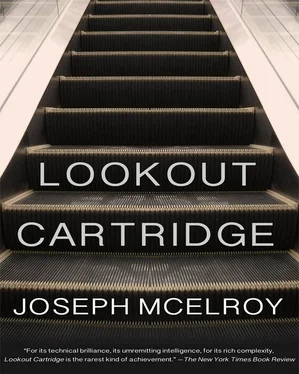Joseph McElroy - Lookout Cartridge
Здесь есть возможность читать онлайн «Joseph McElroy - Lookout Cartridge» весь текст электронной книги совершенно бесплатно (целиком полную версию без сокращений). В некоторых случаях можно слушать аудио, скачать через торрент в формате fb2 и присутствует краткое содержание. Год выпуска: 2014, ISBN: 2014, Издательство: Dzanc Books, Жанр: Современная проза, на английском языке. Описание произведения, (предисловие) а так же отзывы посетителей доступны на портале библиотеки ЛибКат.
- Название:Lookout Cartridge
- Автор:
- Издательство:Dzanc Books
- Жанр:
- Год:2014
- ISBN:9781941088036
- Рейтинг книги:3 / 5. Голосов: 1
-
Избранное:Добавить в избранное
- Отзывы:
-
Ваша оценка:
- 60
- 1
- 2
- 3
- 4
- 5
Lookout Cartridge: краткое содержание, описание и аннотация
Предлагаем к чтению аннотацию, описание, краткое содержание или предисловие (зависит от того, что написал сам автор книги «Lookout Cartridge»). Если вы не нашли необходимую информацию о книге — напишите в комментариях, мы постараемся отыскать её.
Lookout Cartridge — читать онлайн бесплатно полную книгу (весь текст) целиком
Ниже представлен текст книги, разбитый по страницам. Система сохранения места последней прочитанной страницы, позволяет с удобством читать онлайн бесплатно книгу «Lookout Cartridge», без необходимости каждый раз заново искать на чём Вы остановились. Поставьте закладку, и сможете в любой момент перейти на страницу, на которой закончили чтение.
Интервал:
Закладка:
Joseph McElroy
Lookout Cartridge
TO BILL WILSON
LOOKOUT CARTRIDGE
1
It is a silent flash there in the city’s grid, and as I happen to look down at that precise point I am thinking of real estate prices.
From my height the detonation noise is a signal of light only. My cabin responds by at once easing its forward motion so we’re barely moving. We hover level with the goo-foot tower at 40 Wall Street, three quarters of a mile to our right. We have a new purpose.
We dip, and the controls alter the tilt of the rotor head’s swash-plate ring, which is above my head out of sight in the open air.
Had I been watching left or right of where the flash appeared, I would have seen it more clearly still.
Up in the cockpit the flash has been seen and the man in the right-hand seat is reporting it. But something is happening to our prop blades, the cadence is gone. Something is wrong, we throb, we rock, we drop, we wait. The pilot is rubbing his head against the side window, he is peering up.
Helicopters are designed to wait, but can we? We hover lower, the props seem better, but if it is possible to swerve with no forward motion, that’s what we’re doing-or the cabin is now hung on the end of one of its own prop blades.
We have to get down, we can’t just drop onto a roof. We tilt to go ahead toward the river, the heliport; therefore, the swash-plate hasn’t come loose. But in a sensation that is not the vectors of revolution and is not sound, the blades feel less hinged. I know that if the blades’ lag-hinges have come loose, the blades can’t feather and will take too much stress and will snap-the chopper loses its lift; and when it does, does it come down like a landing?
I can’t make out the radio voice from headquarters.
I did not hear the flash, I saw it, just as I was contemplating real estate inflation, Peter Minuit and the Indians, and an American gentleman named John Lloyd Stephens buying a Maya city in the 1840’S for twice what the Dutch gave for Manhattan-the flash just north of City Hall Park could have been a vehicle blowing up. But there was no shock up here.
Smoke came like a substance squeezed from the hole that now narrows following the flash. Not the quick sound of artillery.
And dark points come and move almost as if sound and speed have become identical, but not quite, for I can see them move. They are like genes in a microphotograph.
This light without sound is not the beginning.
Was there a beginning?
Sound without illumination maybe.
Such a field of noise was coming everywhere, from tile, concrete, the chill-blown street above, the tracks below, and even as if from the change booth where a black girl in blue-smoked cartwheel glasses pushed out tokens without looking up from her paper-that till I was through the turnstile and to the brink of the escalator and put my foot on it hearing behind me the click of steps closing fast yet seeming oddly slow, I didn’t guess why the toddling graybeard in a herringbone with the hems drooping who’d preceded me through the turnstile had made for the stairs instead.
But about to put my hands on the escalator rails only to see they weren’t running and clear to the bottom the escalator was stopped, I got a blind jarring shove in my back that jumped me three or four of those stationary steps over the brink just as I felt both my hands stuck in the tailored pockets of the trenchcoat I’d bought in London for this trip to New York. But legs and feet believing they could survive apart from the rest of me slowed their motion to fit the momentum of fall and frequency of steps so my four-steps-at-a-time made a metrobeat my limbs were marking like old times when my school friends and I took stairs three, four at a go and here again now years later no hands.
So I paced my plunge two-thirds of the way before slowing enough to do two, then one at a time, then stop, get the hands and fingers free, and twist to look back up to the top. But I saw only the old man on the adjacent stairs who’d been ahead of me but was now looking down at me no doubt taking me for an escalator freak, not somebody who’d been pushed.
The old man had known the escalator wasn’t running. The pusher perhaps had not.
I ran back up. The steps weighed as much by contrast as if going down the first time I’d been riding. In London they used to call it Moving Staircase.
I pushed through the gate. I could barely hear the change-woman when I said what had happened, but her tongue flickered out and I put her moist smile with her words: Enough to do watching nobody cheats the City.
How was it the steps behind me had been much slower than mine yet right on top of me?
She let me go back through the gate free like a transit worker or a cop, and I went back down the stopped escalator into a noise like the subway rails splitting and caught the train the old man had boarded.
A large black woman yawned without opening her eyes and I smelled her breakfast. Travelers on the London Underground do not as a rule sit with their eyes closed.
I had in my head somewhere why Dagger DiGorro’s film got destroyed. I saw almost none of the film itself and shot only a few minutes of it; but no one saw more than I and I was there when Dagger shot the bulk of it.
Who knew better what was in that film? Only Dagger maybe. And he must have forgotten parts-to judge from what he once said in London and once in Ajaccio and once when we changed the Druid’s tire on Salisbury Plain.
Just the one rush got processed at first. Rush may be rather big talk; we weren’t exactly pros. You’d have thought Dagger cared more for the Beaulieu 16 he got hold of than the film we were supposed to be making with it. Alba took my hand the day Dagger and I left London for Ajaccio, she’d decided she was too pregnant and she was sorry because she’d never seen Corsica and she retains something of the metropolitan French condescension toward La Corse. She said, Cartwright, you take care of Dag, and she put a finger on a button of my shirt where my collarbone is. She wore rust-colored nail varnish. She wouldn’t have expected much from this film idea we’d had that I’d spoken of as mainly his idea. But she loves him, and there was money in the bank and the promise of more in the autumn. And she perhaps did not even want him to stay home; his absence excites her, and she’s as glad as I am to live in London.
When I went to see the Druid south of the river weeks later about my breathing and my imminent trip to New York, the old man sitting there in his dark green business suit told me someday the destruction of Dagger’s film would seem part of a large endless harmony. He asked if my trip would include Cape Kennedy. I said I was not after all a tourist, and he said at once though slowly, But you try to become one.
Which seemed not up to his usual standard so I opened my mouth to get us back to my breathing but the moment grew and the words stayed in my head and instead he spoke: You keep a diary.
I said, I don’t just keep it. And I was about to say I give-or send-parts of it away now and then, but the interview seemed over.
Still, as I was showing myself out he said from the far end of his hall, But what is cinema? Evanescent no doubt. Years ago I went to see a film called Breaking the Sound Barrier .
I have in my head things I may not have exactly seen, just as you who read this have me.
A hand enters a lab’s glass wall through large elastic lips sleeving a glove port.
You have seen this, don’t think you haven’t. Once the hand is into the sleeve it feels its way into a thick lightweight glove in order to get at pieces of who knows what on the other side of the glasscans of bacteria, say.
Читать дальшеИнтервал:
Закладка:
Похожие книги на «Lookout Cartridge»
Представляем Вашему вниманию похожие книги на «Lookout Cartridge» списком для выбора. Мы отобрали схожую по названию и смыслу литературу в надежде предоставить читателям больше вариантов отыскать новые, интересные, ещё непрочитанные произведения.
Обсуждение, отзывы о книге «Lookout Cartridge» и просто собственные мнения читателей. Оставьте ваши комментарии, напишите, что Вы думаете о произведении, его смысле или главных героях. Укажите что конкретно понравилось, а что нет, и почему Вы так считаете.












